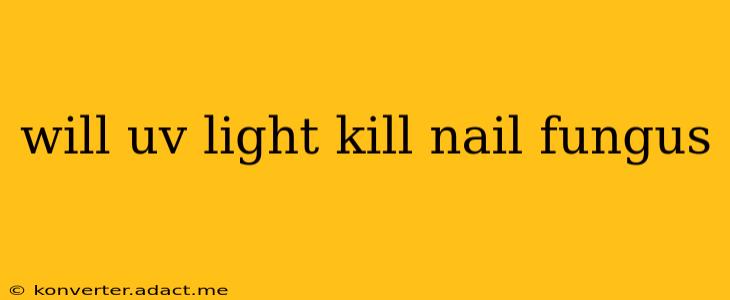Will UV Light Kill Nail Fungus? Exploring UV Light Therapy for Onychomycosis
Nail fungus, medically known as onychomycosis, is a common and frustrating condition affecting millions. While many seek quick fixes, the effectiveness of UV light in treating nail fungus is a question frequently asked. Let's delve into the science and explore the efficacy of UV light therapy in combating this persistent infection.
Understanding Nail Fungus and its Treatment
Before we discuss UV light, it's crucial to understand what causes nail fungus. It's primarily caused by dermatophytes, a type of fungus that thrives in warm, moist environments. These fungi invade the keratin in your nails, leading to discoloration, thickening, and often, painful symptoms. Treatment options vary, from over-the-counter antifungal creams to prescription oral medications. However, the effectiveness of these treatments can depend on the severity of the infection and individual factors.
Can UV Light Kill Nail Fungus? The Science Behind It
UV light, specifically UVB light, has shown some promise in treating certain skin conditions. Its mechanism involves damaging the DNA of microorganisms, including fungi, hindering their growth and reproduction. However, the effectiveness of UV light in treating nail fungus is limited compared to other established methods.
The challenge lies in the penetration depth. UVB light doesn't penetrate the nail plate effectively enough to reach the deeper layers where the fungus often resides. While it might kill fungi on the surface, it's unlikely to eradicate the infection completely. This means that while it might improve the appearance of the nail slightly, it's not a reliable standalone treatment.
What are the Alternatives to UV Light for Nail Fungus Treatment?
Many effective treatments exist for nail fungus. These include:
- Topical antifungal creams: These are available over-the-counter and are often the first line of defense for mild infections. They contain ingredients like terbinafine or ciclopirox.
- Oral antifungal medications: For more severe cases, a doctor may prescribe oral antifungals such as itraconazole or terbinafine. These medications require a prescription and are generally used for more severe or persistent infections.
- Laser therapy: This relatively new treatment uses lasers to target and kill the fungus within the nail. It’s considered a less invasive method compared to oral medications and can be effective in many cases.
Frequently Asked Questions (FAQ)
Does UV light help with nail fungus?
While UV light might offer some minor improvements in the appearance of a fungal nail infection, it's not a reliable or effective treatment on its own. The light doesn't penetrate deeply enough to reach the source of the infection.
What type of UV light is used for nail fungus treatment?
While various forms of UV light exist, there's no specific type of UV light specifically designed or approved for nail fungus treatment. Some clinics may offer UV light as a supplemental therapy, but it should not be the primary treatment method.
Is UV light therapy effective for toenail fungus?
The same limitations apply to toenail fungus as fingernail fungus. UV light lacks the penetration power to effectively target and kill the fungus deep within the nail. Other treatment options are far more effective.
How long does it take to treat nail fungus with UV light?
There is no established treatment duration using UV light for nail fungus. Given its ineffectiveness, any perceived improvement in appearance is likely due to other factors.
What are the side effects of UV light treatment for nail fungus?
The primary side effect of UV light exposure is the risk of sunburn and skin damage, which is why this is not a recommended treatment for fungal nails.
Conclusion:
While UV light might have some antimicrobial properties, its limited penetration into the nail makes it an ineffective treatment for nail fungus. For effective treatment, consult a dermatologist or podiatrist. They can diagnose the infection accurately and recommend the most appropriate treatment option based on the severity of your condition, ensuring the best outcome. Remember, self-treating can delay proper treatment and potentially worsen the infection.
